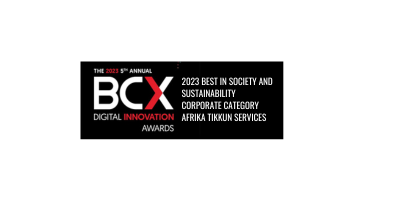The future of work is digital and South Africa (SA) needs to aggressively develop systems to propel the country and its youth forward in the coming year. Leading skills development and placement organisation, Afrika Tikkun Services (ATS) says that the country has no time for conceptualising with no action in the coming year. The time for the brick-and-mortar professional is gone, traditional jobs and ways of working are becoming obsolete without an informal technology-related upgrade. The demand for globally relevant skills has not been isolated to the tech industry, but has spread to all other sectors of the economy. ATS CEO, Onyi Nwaneri warns that without a concerted effort across industries in the public and private sector, SA cannot create the ideal environment for young people to become part of this new growth era on a wider scale.
SA’s youth (age 15-24) account for 35% of the population, yet less than half of these people have employment. “This gives us a unique opportunity to lead Africa and the rest of the world in changing society’s perspective on education,” says Nwaneri. No longer based on a finite number of years spent at a traditional institution, education has been decentralised in line with the fourth industrial revolution. This means that skills development is no longer the job of large institutions and a traditional public and private education system.
“ATS has been at the forefront of innovation in the digital skills development arena through partnerships with private and state institutions. As a community-based youth and skills development organisation, our experience has taught us that multi-sectoral partnerships create better and faster results. ATS is calling for more such partnerships across the different sectors of the economy,” he continues.
The main challenges South Africa’s youth face include a gap in educational quality, and a failure for traditional institutions to provide the skills demanded by the economy. ATS warns that these challenges are a risk to the economy and should be tackled head-on. An ageing workforce, and a growing population of unskilled or poorly skilled youth, means that even the immediate future of the economy in South Africa is uncertain. However, there are glimmers of hope in the trends they have seen, where parts of the economy have been growing in leaps and bounds.
The revolution has already begun
Trends in the past year, like in recent years, have reinforced how the tech industry feeds into every part of the economy, and as such is the new growth frontier for small and medium businesses. Although the industry has not been spared the economy-wide slump as a result of global pressures, it has shown promise and resilience in tough times. The information technology industry is expected to grow at 12% per annum over the next few years, according to analysts at Simply Wallstreet. Growth in the industry has shrunk by 11%, but this can mainly be attributed to larger companies rather than the SMMEs.
One of the major issues holding the industry back is a persistent skills shortage, making labour in the sector expensive and harder to find. The Digital Skills Gap Index, which measures how well countries are meeting the skills demanded by their local and the global economy, currently scores African countries between 1,8 and 5. This pales in comparison to the global average of 6, meaning Africa has an incredible amount of catching up to do.
One of the growth areas young people need to be driven to is big data. Data skills are increasingly becoming in demand in South Africa as industries and the public sector seek to modernise their operations. According to the World Economic Forum, data has become a desirable commodity worldwide, and as such should be a key area of digital skills development. Data capturing, analysis and processing are all high-demand skill areas in South Africa.
“We need to encourage young people, the people who teach them, the people who employ them, and those that raise them, to take digital skills development seriously,” says Nwaneri. “Trends have demonstrated that economic recovery has relied heavily on entrepreneurship. We need more young people hiring young people. A robust and multi-sectoral digital skills revolution is needed in order to create workers who will be hired, and entrepreneurs who will go on to create jobs as they empower themselves and their communities.”
Over the last year, a partnership between ATS and digital giant Naspers subsidiary Naspers Labs culminated in a successful youth focused skills development and placement project which taps directly into the country’s future economic needs. The initiative has empowered and trained over 750 young people with highly demanded digital skills. The skills transferred through the partnership are designed to better position graduates for the future of work in the Fourth Industrial Revolution (4IR).
A number of these young people following the programme have secured highly paid digital jobs in the digital economy. Earning potential of programme projects has averaged between R10 000 to R42 000 a month, demonstrating that once young people are skilled in critical and scarce skills, and in demand jobs, the possibility of accessing well paid and sustainable jobs is high.
Partnerships are the future of tech-savvy education
“It is no longer up to government initiated programmes and systems to create a streamlined pipeline from school to the workplace for young people armed with the correct skills for industries growing the economy and creating employment,” says Nwaneri. Partnerships between private entities, corporations, NGOs, and social enterprises have proven to move much faster in some crucial areas of skills development in South Africa. In many ways, these partnerships have led the way for creating results-based skills development initiatives that have helped thousands of unemployed youths join the workforce and contribute to South Africa’s economic growth.
For young people 2023 is certainly the year for thinking big on digital skills and starting small for opportunities in entrepreneurship. Together we can lead the digital revolution in Africa.


